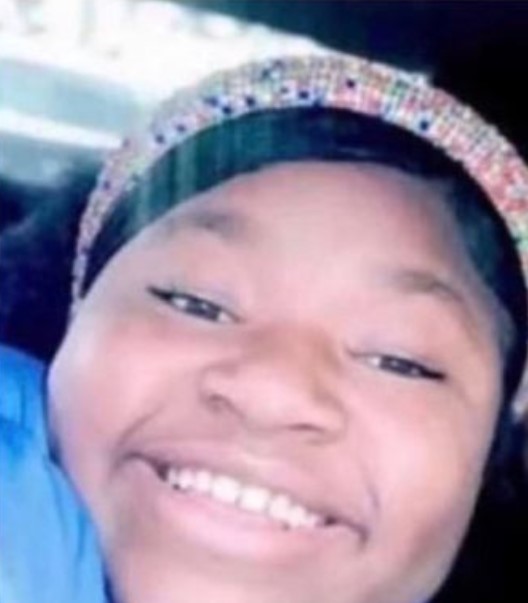There Is No Country For Black Girls Like Ma’Khia Bryant

Source: Screenshot / Twitter
There is no perfect way to be Black, let alone a Black woman or girl child in this world.
The accusations, vitriol, and justifications regarding the murder of 16-year-old Ma’Khia Bryant proved that in more ways than one ever since body camera footage was released detailing her last moments.
Although Black women account for 13 percent of the women population in the U.S., they make up 20 percent of the women fatally shot by the police, and 28 percent of unarmed killings according to a recent report by The Washington Post. Much of this has to do with how society is socialized to perceive Black women, which attributes to the violence evoked against us.
Ma’Khia was also a plus-sized Black girl. Examining the ways fatphobia, rooted in anti-Blackness, undervalues the humanity of Black women and girls is crucial to understanding the rebukes on Ma’Khia’s life. Black, fat bodies are often feared and stigmatized and felt less deserving of love and human decency. It plays out in how Ma’Khia’s story is told with every damning tweet.
Ma’Khia lived in foster care and was an agent of a state that sanctioned her death.
With much left to unpack in the guilty Derek Chauvin verdict over the murder of George Floyd, Ma’Khia’s death details exactly how the pendulum swings for Black women and girls. There is adoration and gluttony for our service to the collective.
Then comes the rage and hate.
Hours before Ma’Khia was fatally shot, Darnella Frazier, who was just 17-years old when she filmed Floyd’s murder, received praise and accolades over a deeply triggering decision to film Chauvin as he knelt on Floyd’s neck. We raved at how beautiful Amanda Gorman was when she recited her breathtaking poem, “The Hill We Climb,” at President Joe Biden‘s inauguration. We said it was important to give Stacey Abrams her flowers for forging a new path in American democracy.
In the same breath, we will justify the abhorrent murder of a 16-year-old child who was clearly in the midst of a crisis. If you’ve never had to fight for your safety, or question your safety, consider yourself privileged.
https://twitter.com/dominiquetaegon/status/1385148587324096514?s=20
https://twitter.com/TelegramJf/status/1385145058517831680?s=20
The officer who fired the fatal shot was identified as Nicholas Reardon, an expert marksman and an active U.S. Air National Guardsman, according to The Daily Beast. Reardon was placed on administrative leave after the shooting and is also reportedly the son of retired Sergeant Edward “Ted” Reardon, who served 32-years with the Columbus Police Department.
In the bodycam footage of Ma’Khia’s death, a bystander yells, “She’s a f***ing kid, man! Damn, are you stupid?” after Reardon fires his gun. It is the first time that her youth is acknowledged and it comes as she lies on the pavement undoubtedly taking her last breaths.
In that moment, an expert marksman shot to kill instead of using his knowledge to disarm.
With only the body cam footage, we are offered one narrative on Ma’Khia’s short life which aligns with stereotypes and tropes assigned to Black women as soon as they are on this side of the womb. She was angry and violent. She lunged at two people with a knife attempting to murder them in cold blood. She was deviant, a trouble maker, acting “too grown” for her age.
We only reserve nuance for white teens and young adults who choose to evoke violence on persons praying, protesting, enjoying a spa day, or enjoying a hotel stay with their parents.
These call-outs, whether they are inferred or implied go directly against the ways in which the people who loved her and knew her best, described her.
On Wednesday, Ma’Khia’s foster sister captioned a tweet of her dancing which read, “This is my foster sister Ma’Khia[.] I want her to be remembered as the sweet full of life young girl she was, not as what people are painting her out to be. I refuse for her to be painted as anything but the amazing girl she was.”
https://twitter.com/itsasiiiaaa_/status/1384743720873074688?s=20
On several fronts, local Columbus authorities and the Columbus Police Department failed to present a clear overview of what transpired when Ma’Khia was killed. In summarizing Ma’Khia’s death, Columbus Mayor Andrew Ginther called her a “young woman,” which many criticized as a form of adultification, where Black girls are perceived to be much older and more mature than their actual age.
Conflicting reports voiced Ma’Khia called the police in fear of her safety, while others stated that an eyewitness who knew Ma’Khia called the police. Instead of detailing what incited the violence on that fateful day, law enforcement instead chose to release additional traumatic footage of a child’s death.
Part of that can be attributed to how we receive and disseminate news, and the other has to do with our inner biases that make us subject to believe that a young Black girl deserved death rather than love, care and support.
SEE ALSO:
Justice For Ma’Khia Bryant: Columbus Protests Demand Accountability After Cops Kill Teen
How To Support Black Youth In The Aftermath Of The Chauvin Verdict And Ma’Khia Bryant‘s Killing


















